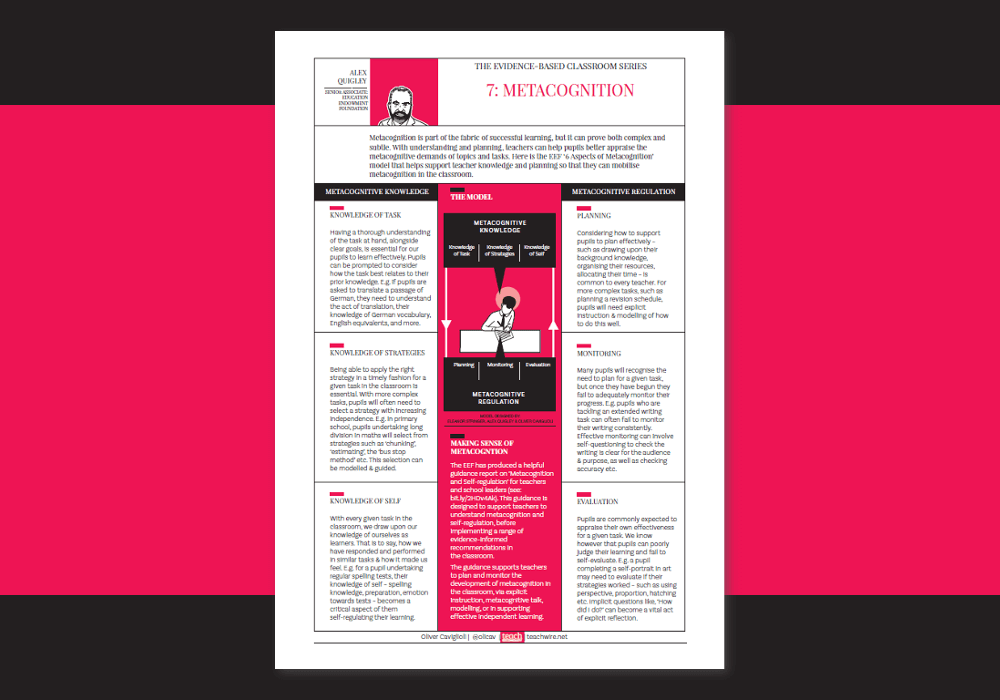PDF poster
KS1, KS2, KS3, KS4
Years 1-11
This poster sets out the EEF ‘6 Aspects of Metacognition’ model. This helps support teacher knowledge and planning so that you can mobilise metacognition in the classroom.
Metacognition is part of the fabric of successful learning, but it can prove both complex and subtle. With understanding and planning, teachers can help pupils better appraise the metacognitive demands of topics and tasks.
Making sense of metacognition with EEF
The EEF has produced a helpful guidance report on metacognition and self-regulation for teachers and school leaders.
This guidance is designed to support teachers to understand metacognition and self-regulation. You can then implement a range of evidence-informed recommendations in your classroom.
The guidance supports teachers to plan and monitor the development of metacognition in the classroom. This is via explicit instruction, metacognitive talk, modelling, or in supporting effective independent learning
Metacognition Q&A with EEF’s Alex Quigley
How much did you understand about metacognition when you were teaching?
I think my understanding was quite limited at that point, and I suspect that’s fairly typical. I’d heard of the term, and had a vague memory of it being covered somehow during my teacher training, but I couldn’t do much with it in the classroom.
Later, when I dug into it more, I started to realise the importance of things like monitoring and evaluating – teaching pupils how to plan.
But how I taught was largely tacit; I didn’t use explicit terminology, for example, which would have made a difference.
What are the advantages for students in understanding more about their own thinking processes?
The crucial advantage is that they gain key knowledge and skills that allow them to approach their end goals strategically – including sitting in an exam hall and performing at their best.
Managing your own thinking, and being well organised and good at planning, gives you the armoury to do well in that context, as well as in others, including beyond the school gate, in the workplace.
And we shouldn’t underestimate the potential emotional impact, either. The self-regulating aspect of understanding metacognition offers concrete strategies for developing resilience and coping with all kinds of high-stress situations.
Where should teachers start with metacognition?
Well, although I might be accused of bias, the EEF guidance report is genuinely a really good place to start.
It’s based on well over a thousand research papers, and does a great job of simplifying the concepts and providing concrete strategies and tools.
Cambridge International also has a good website and Dylan Wiliams explains it very well, too.
There aren’t many books and documents available, surprisingly – but Metacognition, by John Dunlosky and Janet Metcalfe, is definitely worth a look.
What is a common misconception about metacognition?
That you can be ‘generally good at it’; that if you are able to plan a trip or sort out your bedroom, you’ll automatically be great at problem-solving in maths.
Whereas in fact, metacognitive skills need to be subject-specific. You need a set of strategies to plan and write a good essay. That will be different from the set you need to conduct a sound physics experiment.
Alex Quigley is senior associate at EEF. Oliver Caviglioli is a former special school headteacher, who is now an information designer. Follow him on X at @olicav.











